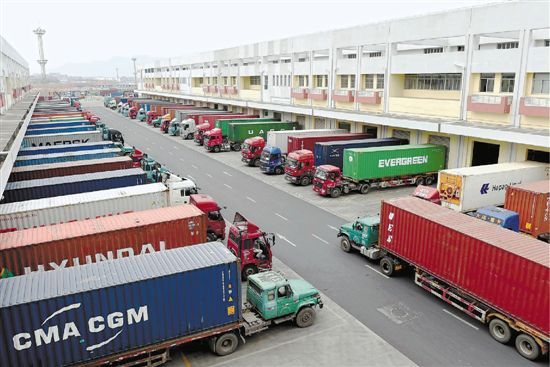Withstanding multiple pressures, China’s foreign trade shows resilience
“China import and export data improved”“Decline narrowed and better than expected”… … In recent days, the New York Times, the Wall Street Journal and other foreign media reported China’s foreign trade data intensively, “Improving” has become a key word . In the first eight months of this year, the value of China’s imports and exports of goods was 27.08 trillion yuan, a record high despite a slight drop of 0.1 percent year-on-year. In the face of sluggish global economic growth and rising protectionism, it is not easy for China’s foreign trade to maintain its smooth operation under the downturn in the foreign demand market.
According to a report in June by the Washington Post, the World Bank said the global economy is slowing sharply, with global growth expected to slow to 2.1 percent this year from 3.1 percent in 2022, and it will remain“Weak” next year. Under such circumstances, China’s foreign trade has shown relatively strong resilience, with the volume of exports increasing month-on-month for three consecutive months, and the decline in imports and exports has narrowed in August compared with June and July, sends a stabilising signal. It should be noted that China’s current foreign trade is indeed under pressure, ups and downs, there are challenges, but foreign trade new products, new forms of business, and so also showed full momentum.
Cross-border e-commerce becomes a new bright spot in China’s foreign trade. According to the digital trade development and Cooperation Report 2023, China’s business-to-consumer (B2C) e-commerce transactions accounted for 37.2% of the global total in 2022, ranking first in the world. E-commerce optimizes international trade and production processes through digital technology, reduces transaction and production costs, optimizes supply and demand matching, and allocates various cross-border resources efficiently, it has played an important role in China’s foreign trade and two-way flow of transnational capital. Take the case of Pinduoduo’s cross-border e-commerce platform Temu. Deutsche Welle reported on September 5 that the e-commerce platform has been growing rapidly since its launch in the United States last September, temu has 4.5 m monthly active users in the US alone and had 77.3 m as of July, more than double the number at the start of the year. Deutsche Welle quotes retail analysts in Toronto as saying that TEMU has created a factory-direct model that allows it to offer preferential prices and a wide range of goods that do not traditionally exist in western retailing. With food, housing and gas inflation surging in the west, it looks very tempting. The rise of Temu has ushered in a new era in global online shopping, industry Australian Broadcasting Corporation and experts said.
China’s export structure is better. In the first eight months of this year, the technology-intensive and high-value-added industries, represented by mechanical and electrical products, were full of energy, with the export of automobiles reaching 442.7 billion yuan, up 104.4% , showing a very eye-catching performance. Exports from China’s auto industry have quadrupled in just three years, overtaking Japan as the world’s largest auto exporter this year, the New York Times reported. CNN (CNN) — in the first half of this year, Chinese automakers rolled out electric cars that swept the world, chinese companies have exported nearly 350,000 electric cars to nine European countries, more than in all of 2022, and EU imports of Chinese cars have quadrupled in the past five years. The continuous upgrading of China’s foreign trade structure reflects the new trend of high-quality development of China’s economy.
The effects of China’s stable foreign trade policy continue to emerge. Recently, departments around the country have continuously enriched, adjusted and improved relevant policies, implemented a combination of stable foreign trade policies to help enterprises stabilize orders and expand the market. In order to further promote the goal of promoting the stability and quality of imports and exports, the Ministry of Commerce will continue to make efforts to facilitate the movement of cross-border business personnel, support the marketing of enterprises at home and abroad, and enhance the level of foreign trade and financial services The general administration of customs will further expand the“Single window” function of international trade at the national and local levels, establish and improve the regular communication and exchange mechanism with enterprises, and deepen the“Policy of sending customs officers to your door”… … We believe these measures will further boost the motivation of foreign trade enterprises and consolidate confidence in the growth of foreign trade This year marks the 10th anniversary of the “Belt and Road cooperation” initiative, and representatives from more than 90 countries have confirmed their participation in the 3rd forum for international cooperation on Belt and Road cooperation In the first eight months of this year, China’s imports and exports to the 152“Belt and Road” countries totaled 12.62 trillion yuan, up 3.6 percent year on year and accounting for 46.6 percent of the country’s foreign trade. As the economic and trade relations between China and the “Belt and Road” countries are steadily improving, it will further help to stabilize the scale and structure of China’s foreign trade.
China’s long-term economic fundamentals have not changed, coupled with a good industrial system and complete production capacity, foreign trade development resilience, room for manoeuvre. At the same time, China has persisted in opening up, actively promoted international economic and trade cooperation, and introduced a series of policies and measures to stabilize foreign trade.